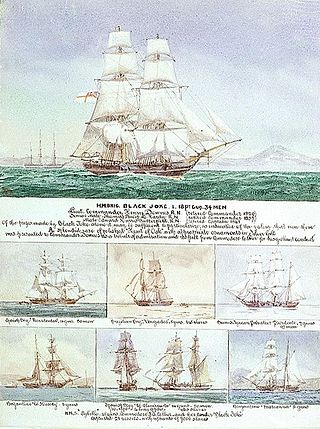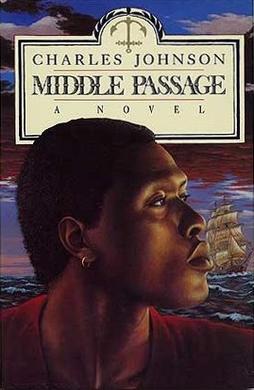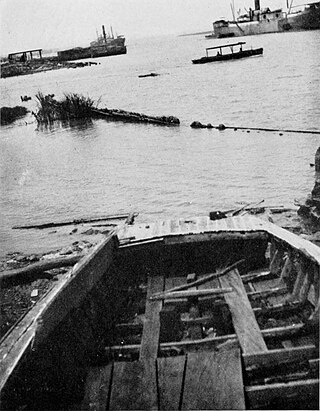
Citizen of the Galaxy is a science fiction novel by American writer Robert A. Heinlein, originally serialized in Astounding Science Fiction and published in hardcover in 1957 as one of the Heinlein juveniles by Scribner's. The story is heavily influenced by Rudyard Kipling's Kim.

Wilbur Addison Smith was a Northern Rhodesian-born British-South African novelist specializing in historical fiction about international involvement in Southern Africa across four centuries.

Ship of Magic is a 1998 fantasy novel by American writer Robin Hobb, the first in her Liveship Traders Trilogy.

Nathaniel Gordon was an American slave trader who was the only person in the United States to be tried, convicted, and executed by the federal government for having "engaged in the slave trade" under the Piracy Law of 1820.

The West Africa Squadron, also known as the Preventative Squadron, was a squadron of the British Royal Navy whose goal was to suppress the Atlantic slave trade by patrolling the coast of West Africa. Formed in 1808 after the British Parliament passed the Slave Trade Act 1807 and based out of Portsmouth, England, it remained an independent command until 1856 and then again from 1866 to 1867.

Middle Passage (1990) is a historical novel by American writer Charles R. Johnson about the final voyage of an illegal American slave ship on the Middle Passage. Set in 1830, it presents a personal and historical perspective of the illegal slave trade in the United States, telling the story of Rutherford Calhoun, a freed slave who sneaks aboard a slave ship bound for Africa in order to escape a forced marriage. The novel received critical acclaim, winning the 1990 U.S. National Book Award for Fiction.

The schooner Clotilda was the last known U.S. slave ship to bring captives from Africa to the United States, arriving at Mobile Bay, in autumn 1859 or on July 9, 1860, with 110 African men, women, and children. The ship was a two-masted schooner, 86 feet (26 m) long with a beam of 23 ft (7.0 m).

When the Lion Feeds (1964) is the debut novel of Rhodesian writer Wilbur Smith. It introduces the Courtney family, whose adventures Smith would tell in many subsequent novels. In 2012, Smith said the novel remained his favourite because it was his first to be published.
The Courtney Novels are a series of seventeen novels published between 1964 and 2019 by Wilbur Smith. They chronicle the lives of the Courtney family, from the 1660s through until 1987. The novels can be split into three parts; the original trilogy of novels follow the twins Sean and Garrick Courtney from the 1860s until 1925. The second part is five books which follows Centaine de Thiry Courtney, her sons and grandchildren between 1917 and 1987. The third part, the most recently written, follows the Courtney family from the 1660s through until 1939, focusing on successive generations of the family. There are also two books that follow the third series. As well, there are three additional Courtney books.
The Ballantyne Novels are a series of novels published between 1980 and 1984 by Wilbur Smith. They chronicle the lives of the Ballantyne family, from the 1860s to the 1980s against a background of the history of Rhodesia.

Sunny South, an extreme clipper, was the only full-sized sailing ship built by George Steers, and resembled his famous sailing yacht America, with long sharp entrance lines and a slightly concave bow. Initially, she sailed in the California and Brazil trades. Sold in 1859 and renamed Emanuela, she was considered to be the fastest slaver sailing out of Havana. The British Royal Navy captured Emanuela off the coast of Africa in 1860 with over 800 slaves aboard. The Royal Navy purchased her as a prize and converted her into a Royal Navy store ship, Enchantress. She was wrecked in the Mozambique Channel in 1861.

African Slave Trade Patrol was part of the Blockade of Africa suppressing the Atlantic slave trade between 1819 and the beginning of the American Civil War in 1861. Due to the abolitionist movement in the United States, a squadron of U.S. Navy warships and Cutters were assigned to catch slave traders in and around Africa. In 42 years about 100 suspected slave ships were captured.

The Capture of Veloz Passagera was a single-ship action that occurred during the British Royal Navy's anti-slavery blockade of Africa in the early and mid 19th century. The sloop-of-war HMS Primrose, of 18 guns, under Captain William Broughton, captured the 20-gun Spanish slave ship Veloz Passagera, Jozé Antonio de la Vega, master.

Men of Men is a novel by Wilbur Smith, the second in the Ballantyne Novels series. It is set in the 1880s during the colonisation of Rhodesia and the First Matabele War and climaxes with the Shangani Patrol.

The Angels Weep is a 1982 novel, the third in Wilbur Smith's series about the Ballantyne family of Rhodesia. The first part of the book is set immediately before and during the Second Matabele War, then the second part jumps forward to the final days of the Rhodesian Bush War.
Dart was a ship launched in South America under a different name. She was taken in prize circa 1806. Once under British ownership she performed one voyage as a whaler in the southern whale fishery. She then traded as a merchantman before in 1810 receiving a letter of marque. As a privateer she did something quite unusual: she made a voyage to Africa where she captured five slave ships. After this Dart returned to normal trading, this time with South America. In 1813 as she was returning to London from Buenos Aires she stopped at Pernambuco, where she was condemned as unseaworthy.

Redoshi was a West African woman who was enslaved and smuggled to the U.S. state of Alabama as a girl in 1860. Until a later surviving claimant, Matilda McCrear, was announced in 2020, she was considered to have been the last surviving victim of the transatlantic slave trade. Taken captive in warfare at age 12 by the West African kingdom of Dahomey, she was sold to Americans and transported by ship to the United States in violation of U.S. law. She was sold again and enslaved on the upcountry plantation of the Washington M. Smith family in Dallas County, Alabama, where her owner renamed her Sally Smith.
Thomas was the ship Sally that James Jones acquired in 1785. Thomas made seven voyages from Bristol as a slave ship in the triangular trade in enslaved persons. On her fourth such voyage,Thomas and five other enslaving ships, bombarded Calabar for more than three hours to force the local native traders to lower the prices they were charging for captives. The French captured her in 1794 as she was on her way for her eighth voyage.
Ralph Fisher (1746–1803) was an English slave trader based in Liverpool who was responsible for over 100 slave voyages. He is said to have been the seventh-biggest slave trader in Liverpool.














